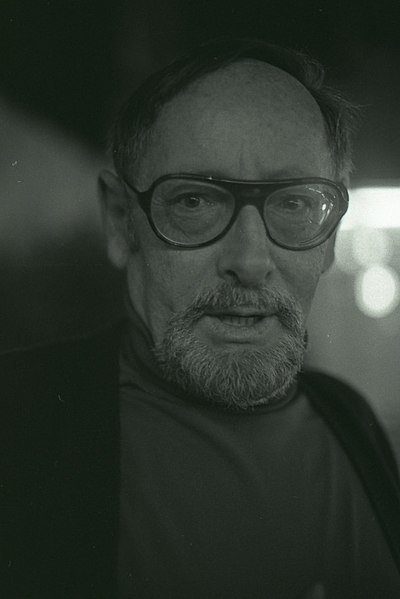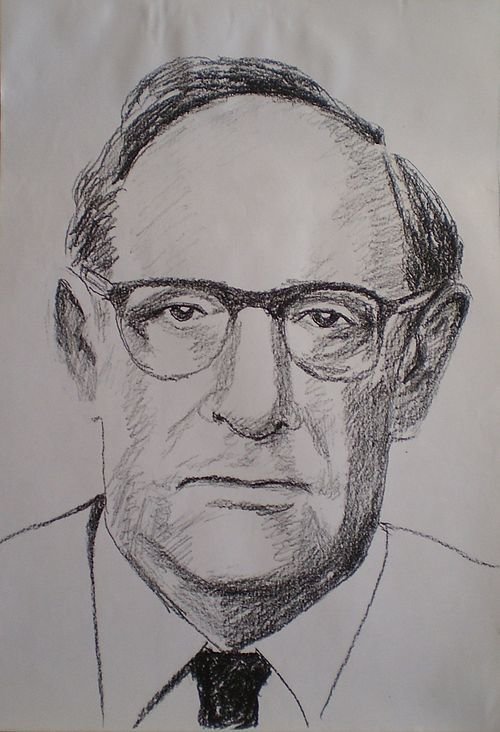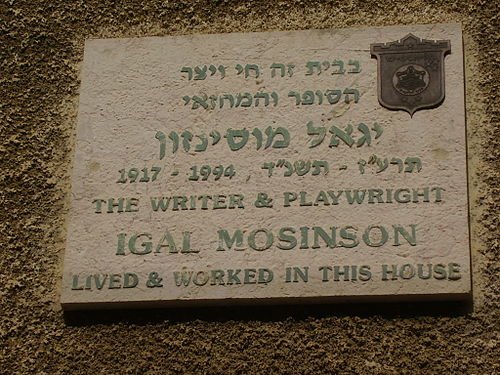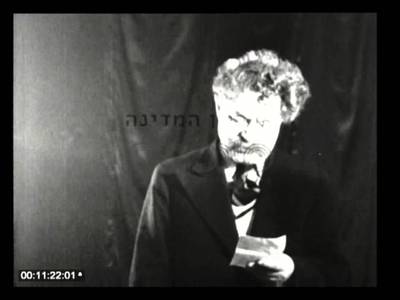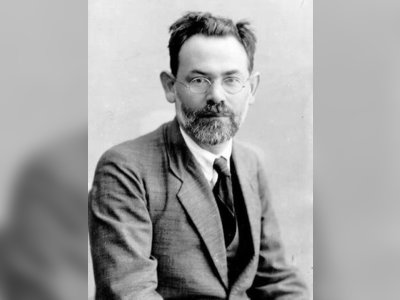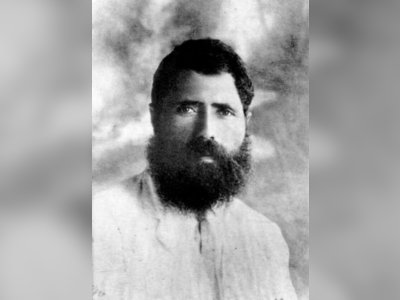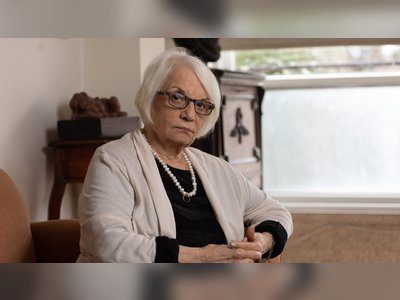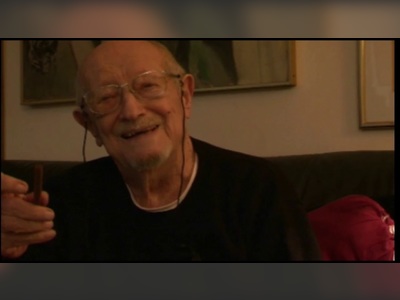Yigal Mossinson: A Life in Literature and Theater
Yigal Mossinson (December 25, 1917 - May 1, 1994) was a prominent Israeli writer and playwright, celebrated for his literary contributions and theatrical productions. His most notable works include the "Hesmaba" series of books, as well as the plays "In the Negev Plains" and "Kazablan."
Early Life
Yigal Mossinson was born on the 10th of Tevet, 5678 (December 25, 1917) to Asher Mossinson (originally Zalman Zomer) and Devora, in the Moshav of Ein Ganim near Petah Tikva, Israel. His father, a pioneer settler who arrived in the land of Israel in 1911, played a significant role in founding the Moshav and was a respected teacher.
Yigal spent his childhood in the Shapak neighborhood of Tel Aviv. During his youth, he attended Tel Nordau School in Tel Aviv and also studied at Kibbutz Beit Alpha and the Youth Village of Ben Shemen. He later relocated to Kibbutz Na'an, where he resided from 1938 to 1950.
In 1943, he joined the Palmach, a Jewish paramilitary organization, but was arrested by the British authorities and interned in the Latrun detention camp.
In 1944, his first story, "Lil Sharav" ("A Night in Sharav"), was published in the "Al Hamishmar" newspaper. He and his comrades from the Palmach generation published "Yalkut Hara'im," a literary magazine. During the War of Independence, he served as a cultural officer in the Givati Brigade.
In 1949, following the publication of a story titled "Derech Gevar" ("A Man's Way"), which was later included in a 1953 novel of the same name, Mossinson was compelled to leave the kibbutz, as were other creative individuals of his generation who were restricted and censored in their artistic pursuits and ultimately left their kibbutzim. The story delved into the intimate aspects of communal life on the kibbutz.
Mossinson and his family then relocated to Kibbutz Beit Sha'arayim. While there, he worked as a mason alongside the future Minister of Finance, Yisrael Galili. Later, they moved to Tel Aviv and resided in a rented room in the apartment of Bezalel Lundon, a theater actor and the father of Yaron Lundon. In this room, Mossinson wrote two plays for the Metate Theater and published his first books as part of the "Hesmaba" series.
The series' protagonist was named after Yaron Lundon, whom he became acquainted with during his time living with Lundon's family. In 1952, he served for two years as a press officer and spokesperson for the Israel Police. He later took on the role of spokesperson for the "Habima" Theater, where his play "In the Negev Plains" was staged, garnering unprecedented success and capturing the spirit of the era.
In 1957, Mossinson founded the "Sadan" Theater in a converted movie theater in Tel Aviv and managed it. His vision was to establish a theater exclusively for original plays. However, the theater did not thrive financially and eventually closed. In 1959, he moved to the United States to work there and support the theater's financial needs. During his time in the U.S., he gained fame with a novel written over about six months, titled "Yehuda Ish Krayot," which was published by Saint Martin's Press and received critical acclaim upon its release.
Espionage and the Pursuit of Nazi Criminals
Yigal Mossinson was approached by Mossad agent Zvi Aldubi to assist in capturing the Nazi criminal Martin Bormann. The two of them traveled to Europe, where they learned that Leon Degrelle (a Belgian politician who collaborated with the Nazis during World War II and led the Walloon Legion) was in the city of Seville and knew Bormann's whereabouts. Unfortunately, they were discovered and arrested by the Spanish police and subsequently deported.
Return to Israel and Later Years
In early 1965, Mossinson returned to live in Israel. In his later years, he began exploring various inventions, some of which did not achieve significant success but provided him with immense satisfaction in the process. One of his inventions, harnessing energy from sea waves, gained substantial recognition among experts and even received public funding for further development. Mossinson found more fulfillment in the fascinating world of invention and creativity than in economic pursuits.
Yigal Mossinson passed away on the 20th of Iyar, 5754 (May 1, 1994), and was buried in the Yarkon Cemetery. To honor his memory, various places in Israel were named after him, including a square in Haifa, a garden in Herzliya, and streets in Tel Aviv, Or Akiva, Rishon LeZion, Petah Tikva, and more.
Family Life
Yigal Mossinson was married four times. From his first wife, he had a son named Avital, one of the founders of Israeli television, who was also involved in cultural activities in India and managed the Jerusalem Theater. With his second wife, Esther, he had two sons, Ido and Chumi. Ido, who tragically lost his life in the Yom Kippur War, was a member of the Chamber Theater. His third wife, Doris (formerly Surukha), bore him a son named Yoni. In 1966, he married his fourth wife, Hannah (née Mishkinsky), with whom he remained married for nearly 30 years. Hannah is an artist and educator. Together, they had two children: Ran Mossinson, a social activist and communications professional, and Gili Mossinson, a basketball player.
One of Yigal Mossinson's brothers, Moshe Mossinzon, was a writer and a member of Kibbutz Na'an. His nieces, the daughters of Moshe Mossinzon, include children's author Devorah Omer and poet and publisher Vered Mossinzon. His nephew, Israel Mossinzon, is the author Amos Mossinzon.
As a Writer and Playwright
Mossinson began publishing in the "Yalkut Hara'im" magazines, which were published between 1942 and 1946. His first collection of stories, "Aforim Keshak" (1946) (a title inspired by a poem by Nathan Alterman, "...Give me a gray hatred like a sackcloth..."), focused on kibbutz life. His play "In the Negev Plains" dealt with the period of the War of Independence and was set in an imaginary kibbutz named Bak'at Yoav, struggling desperately against invading Egyptian forces. The play stirred controversy when it premiered at the "Habima" Theater in 1949 because some military leaders in the audience supported a retreat from the kibbutz depicted in the play.
One of his most controversial novels was "Derech Gevar" ("A Man's Way"), which delved into the intimate aspects of communal life on the kibbutz. His other novels include "Ein Khadash Tachat Hashemesh" ("Nothing New Under the Sun") (1955), "Rishmaya" (1960), and "Yehuda Ish Krayot" (1959), which gained him recognition in the United States.
Legacy
Yigal Mossinson's contributions to Israeli literature and theater are celebrated to this day. His works continue to be studied and performed, offering a glimpse into the complexities of life in Israel during the mid-20th century. Mossinson's exploration of kibbutz life and his portrayal of the challenges and triumphs of the early years of the state of Israel have left a lasting mark on Israeli literature and culture.
Bibliography
* "Aforim Keshak" (1946)
* "In the Negev Plains" (play, 1949)
* "Derech Gevar" ("A Man's Way") (1953)
* "Ein Khadash Tachat Hashemesh" ("Nothing New Under the Sun") (1955)
* "Yehuda Ish Krayot" (1959)
* "Rishmaya" (1960)
Filmography
* "Kazablan" (film adaptation of the play, 1973)
- יגאל מוסינזוןhe.wikipedia.org
